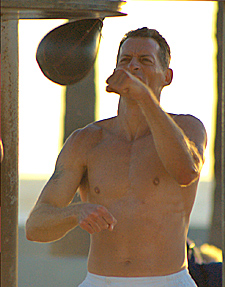Last month I discussed the importance of recruiting for ministry. This importance springs out of the wonderful, but unexpected gospel blessing of the priesthood of all believers, and the practical reality that the bottleneck, humanly speaking, to growing ministry is the lack of trained volunteers.
In that article I argued that life, both for us and others, is about recruiting and training. We must allow ourselves to be recruited into all sorts of service, and must be active in recruiting others.
 This month I want to think about training. Who do we train? What do we train in? How do we train?
This month I want to think about training. Who do we train? What do we train in? How do we train?
Before answering these questions, which put flesh on training in our churches I want to state my conclusions. They are:
1. Every person who is owned by Jesus needs to both keep being trained and work on training others
From the moment of conversion the Christian life is one of growing to maturity, of constant change and transformation, and this happens through training. But to only be concerned for my maturity is selfish and a sign of immaturity. We must also be concerned for the training of others. Such a way of thinking leads me to ask everyone the same two questions, no matter where they are in Christian maturity:
"¢ How am I being trained to be more like Christ and a better servant of others?
"¢ Who am I helping to be trained to be more like Christ and a better servant of others?
Why don't you write your answers on a piece of paper?
2. Training in godliness is the fundamental content of training
The apostle Paul leaves us in no doubt about this in 1 Tim 4: 8: "For physical training is of some value, but godliness has value for all things, holding promise for both the present life and the life to come." Godliness is not some magic cloak dropped on Christians, but it requires training and discipline. It grows as we mature in Christ. Training for tasks and events, even those performed in church, is really of little value if it is not training us to be godly. Godliness can be described as wholehearted joyful obedience to Christ in service of others.
3. Training operates at two levels
The first is content taught by a teacher, the second is character transformation which is learnt by the student. In training there is a trainer and a trainee. The teacher can teach a task, but the student learns far more than the task- they learn attitudes and ways of thinking.
4. Deep, character transforming training happens almost invisibly as other activities are done
How are we to be trained in godliness? What courses can I do? As with all the deep character aspects of life, godliness is learnt as we engage in other activities. Take for example telling the truth. Classes on truth telling never produce the desired result. Children learn truthfulness as they experience life with others who tell the truth.
So training in godliness occurs as we engage in ministry with others, and change through observation and the experience to delight in being a slave of Christ, and the honour of working alongside Him. The task we are engaged in, such as how to welcome people at church may be taught in a classroom, but godliness is learnt as we do the task.
So often we learn to be godly by doing tasks. My own experience was while on a church camp, being asked to help with the washing up, and in that, the other person showed me how to be a servant. The task helped me to learn godliness.
So then who do we train? Everyone, including ourselves, as it is the God given means of Christian growth. Why not think about who to work with in training?
What do we train in? Godliness is the answer, and that happens as we learn to serve others in our proclamation of the glory of Christ.
How do we train? Any activity in which we are engaged is an opportunity to train another person. That is, of course, providing you are working in joyful obedience to Christ.






















